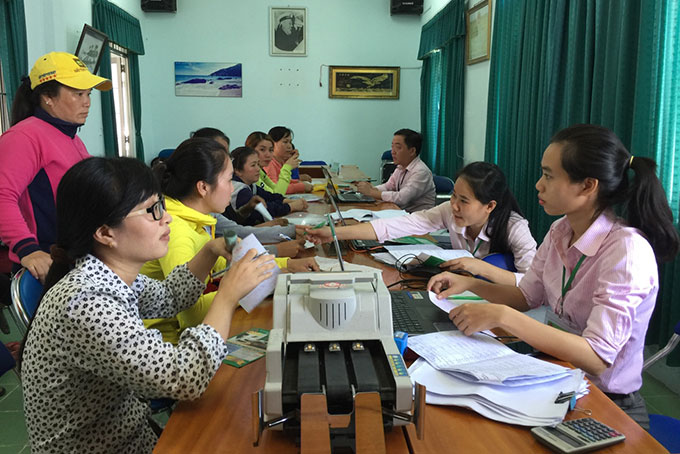
In order to improve credit quality, Vietnam Bank for Social Policies (VBSP) has cooperated with socio-political organizations receiving loan entrustments to regularly review, verify, check and ensure right lending, timely disbursement, and use of loans for right purposes.
In order to improve credit quality, Vietnam Bank for Social Policies (VBSP) has cooperated with socio-political organizations receiving loan entrustments to regularly review, verify, check and ensure right lending, timely disbursement, and use of loans for right purposes.
Loans used effectively
Huynh Huu Phung (in Cam Thinh Dong Commune, Cam Ranh City) borrowed VND30 million from a credit program for job creation of VBSP to raise sheep in 2015. Up to now, his family's sheep have increased from 10 to 40. This is his family's main income for their living and their children's schooling. Thanks to the funding from VBSP, many households in Cam Ranh City have conditions to develop economy, and improve living standards and income. Up to now, policy credit balance in the city has been over VND366 billion; the overdue debt is only 0.17%, showing that the quality of policy credit in the province is good. In order to have that result, the Transaction Office of VBSP in Cam Ranh City in collaboration with local authorities, socio-political organizations taking loan trust seriously implemented from review, appraisal of loan purposes, supervision. , and check to ensure that the loan is used for the right purposes, with the right subjects and effectively.
Tran Thanh Trung (Ninh Giang ward, Ninh Hoa town) borrowed money from VBSP to raise cows and plant chrysanthemum. According to Trung, many local people also rely on loans to improve their income. From the effectiveness of the loan capital for the models of breeding, cultivation, the borrowers are able to repay the principal and interest to the VBSP. Besides, the sense of repayment of most borrowers in the ward is very good. As a result, the policy credit quality has been improved. Ninh Giang Ward is a locality with low overdue debt ratio; the overdue debt is only about VND48 million among VND16 billion of the credit balance.
Like Ninh Giang ward, many communes and wards in Ninh Hoa town have well managed the policy capital. Ninh Hoa town is the locality with the largest policy credit loans in the province, with more than VND540 billion and lending area of 27 communes and wards. Recently, although the Covid-19 epidemic has partly affected the borrowers, the overdue debt ratio was still low, accounting for only 0.22% of the total loans. Thanks to the policy credit capital to the right beneficiaries, people have access to preferential loan programs, thus contributing to restricting usury and "black credit" activities in the area.

|
Solutions to improve credit quality
Up to now, the credit balance of policy credit programs in the province are nearly VND2,864 billion. In particular, the programs with large credit include loans for clean water and environmental sanitation programs, job creation, near-poor households, poor households, newly-escaped-poverty households, production households, and difficult areas. Along with focusing on credit growth, VBSP always focuses on implementing measures to consolidate and improve credit quality. Currently, the overdue debt rate is at 0.28%, a slight decrease compared to the end of 2019 (0.29%). In 2020, VBSP strives for overdue debt ratio below 0.27%, communes with overdue debt of over 1.5%; 38 communes have no overdue debts; quality of policy credit activities at commune level: over 90% rated as good, no localities rated as weak, medium; the quality of policy credit activities in the district: 100% classified as good.
According to Mr. Le Van Thanh - Head of Planning - Credit Department of VBSP in Khanh Hoa Province, in order to implement the set targets, VBSP continues to consult the Board of Directors at all levels to implement the inspection and supervision program effectively; well implementing the information propaganda, transparent disclosure of credit mechanisms and policies so that people, especially poor households and other policy beneficiaries, understand clearly the purpose and preferential credit policy incentives, the meaning of each program and the responsibility to repay the debt on schedue; reviewing, analyzing debts and making dossiers of request for handling risks of debts fully handled as prescribed; continue to well carry out the handling of due debts...
Nam Du
Translated by T.T




